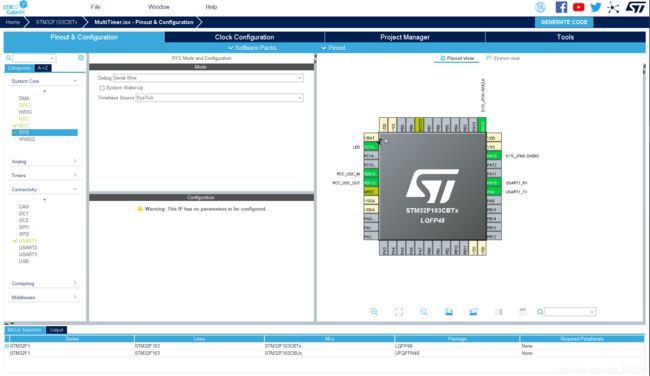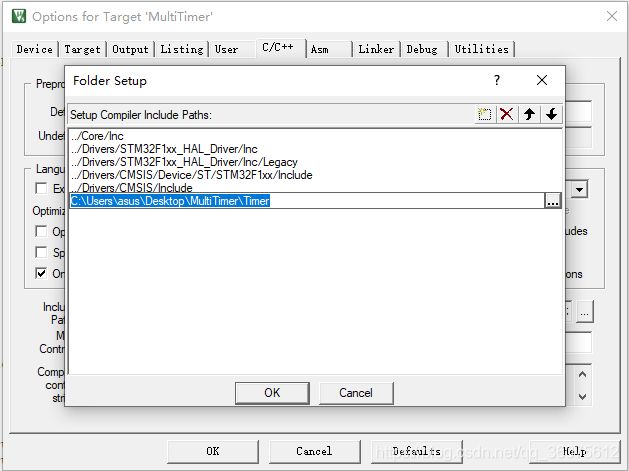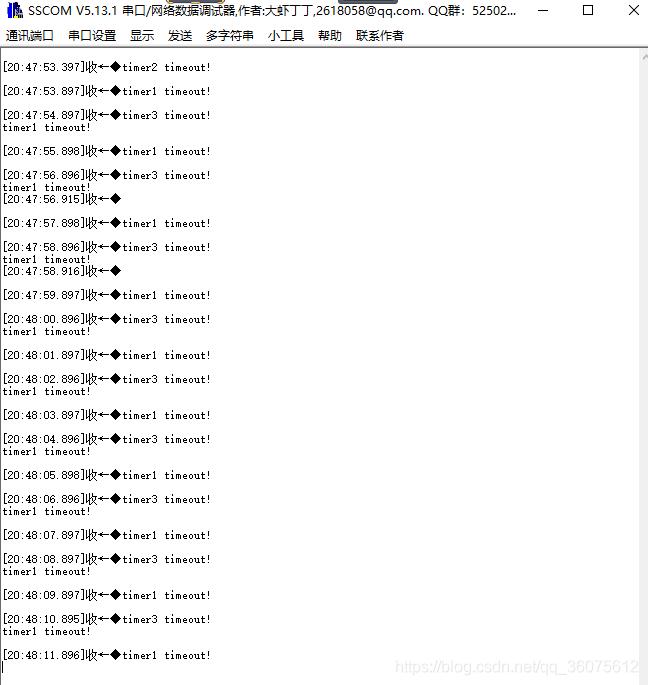STM32HAL 移植 MultiTimer 极简美开源软件定时器(裸机开发神器)
目录
概述
一、使用方法
二、STM32CubeMx配置
三、Examples
四、运行结果
五、总结
概述
MultiTimer 是一个软件定时器扩展模块,可无限扩展你所需的定时器任务,取代传统的标志位判断方式, 更优雅更便捷地管理程序的时间触发时序。
GitHub:https://github.com/0x1abin/MultiTimer
硬件:STM32F103CBT6最小系统板
软件:Keil 5.29 + STM32CubeMX6.01
一、使用方法
1.先申请一个定时器管理handle
struct Timer timer1;
2.初始化定时器对象,注册定时器回调处理函数,设置延迟启动时间(ms),循环定时触发时间
timer_init(struct Timer* handle, void(*timeout_cb)(), uint32_t timeout, uint32_t repeat);
3.启动定时器
timer_start(&timer1);
4.设置1ms的硬件定时器循环调用 timer_ticks() 以提供时间基准
void HAL_SYSTICK_Callback(void)
{
timer_ticks();
}
5.在主循环调用定时器后台处理函数
int main()
{
...
while(1) {
...
timer_loop();
}
}二、STM32CubeMx配置

三、Examples
简单粗暴,直接上代码
打开STM32CubeMX生成的Keil工程,如下所示:
把代码下载下来,新建Timer文件夹把multi_timer.c,multi_timer.h这两个文件添加到项目中来即可。
1、multi_timer.h文件
/*
* Copyright (c) 2016 Zibin Zheng
* All rights reserved
*/
#ifndef _MULTI_TIMER_H_
#define _MULTI_TIMER_H_
#include "stdint.h"
#include "stddef.h"
typedef struct Timer {
uint32_t timeout; // 超时时间(用来与定时器心跳比较)
uint32_t repeat; // 循环定时触发时间(周期定时设置),为0时代表单次定时
void (*timeout_cb)(void); // 定时器回调处理函数
struct Timer* next; // 指向下一个定时器节点
}Timer;
#ifdef __cplusplus
extern "C" {
#endif
void timer_init(struct Timer* handle, void(*timeout_cb)(), uint32_t timeout, uint32_t repeat);
int timer_start(struct Timer* handle);
void timer_stop(struct Timer* handle);
void timer_ticks(void);
void timer_loop(void);
// void timer_again(struct Timer* handle);
// void timer_set_repeat(struct Timer* handle, uint32_t repeat);
#ifdef __cplusplus
}
#endif
#endif
2、multi_timer.c文件
/*
* Copyright (c) 2016 Zibin Zheng
* All rights reserved
*/
#include "multi_timer.h"
//timer handle list head.
static struct Timer* head_handle = NULL;
//Timer ticks
static uint32_t _timer_ticks = 4294967290;
/**
* @brief Initializes the timer struct handle.
* @param handle: the timer handle strcut.
* @param timeout_cb: timeout callback.
* @param repeat: repeat interval time.
* @retval None
*/
void timer_init(struct Timer* handle, void (*timeout_cb)(), uint32_t timeout, uint32_t repeat)
{
// memset(handle, sizeof(struct Timer), 0);
handle->timeout_cb = timeout_cb;
handle->timeout = _timer_ticks + timeout;
handle->repeat = repeat;
}
/**
* @brief Start the timer work, add the handle into work list.
* @param btn: target handle strcut.
* @retval 0: succeed. -1: already exist.
*/
int timer_start(struct Timer* handle)
{
struct Timer* target = head_handle; // 设置一个临时变量就不会改变
// 遍历查找判断该节点是否已存在
while(target)
{
if(target == handle)
return -1; //already exist.
target = target->next; // 不断遍历下一个节点
}
// 采用链表前插的方式,最新的定时器放在前面并作为头结点
handle->next = head_handle;
head_handle = handle;
return 0;
}
/**
* @brief Stop the timer work, remove the handle off work list.
* @param handle: target handle strcut.
* @retval None
*/
void timer_stop(struct Timer* handle)
{
struct Timer** curr;
for(curr = &head_handle; *curr;)
{
struct Timer* entry = *curr;
if(entry == handle)
{
*curr = entry->next; // 将当前节点脱离队列
// free(entry);
}
else
curr = &entry->next; // 二级指针curr不断后移
}
}
/**
* @brief main loop.
* @param None.
* @retval None
*/
void timer_loop() // 在While循环中使用,定时器才会起作用
{
struct Timer* target;
for(target = head_handle; target; target = target->next)
{
#if 1
if(_timer_ticks >= target->timeout)
#else
//_timer_ticks 这个变量会出现溢出的情况,因为它是32位的,所以不能大于0xFFFFFFFF = 4,294,967,295,
//一天有多少s, 24*60*60*1000 = 86,400,000s,也就是改变了一直累加49.7天就会溢出,4,294,967,295 / 86,400,000 = 49.71026961805556天
if((int)((uint32_t)(target->timeout -_timer_ticks)) <= 0)
#endif
{
if(target->repeat == 0)
{
timer_stop(target);
}
else
{
target->timeout = _timer_ticks + target->repeat;
}
target->timeout_cb();
}
}
}
/**
* @brief background ticks, timer repeat invoking interval 1ms.
* @param None.
* @retval None.
*/
void timer_ticks() // 在定时器中断中调用该函数
{
_timer_ticks++;
}
3、stm32f1xx.it.c文件
/* USER CODE BEGIN Header */
/**
******************************************************************************
* @file stm32f1xx_it.c
* @brief Interrupt Service Routines.
******************************************************************************
* @attention
*
* © Copyright (c) 2021 STMicroelectronics.
* All rights reserved.
*
* This software component is licensed by ST under BSD 3-Clause license,
* the "License"; You may not use this file except in compliance with the
* License. You may obtain a copy of the License at:
* opensource.org/licenses/BSD-3-Clause
*
******************************************************************************
*/
/* USER CODE END Header */
/* Includes ------------------------------------------------------------------*/
#include "main.h"
#include "stm32f1xx_it.h"
/* Private includes ----------------------------------------------------------*/
/* USER CODE BEGIN Includes */
/* USER CODE END Includes */
/* Private typedef -----------------------------------------------------------*/
/* USER CODE BEGIN TD */
/* USER CODE END TD */
/* Private define ------------------------------------------------------------*/
/* USER CODE BEGIN PD */
extern void HAL_SYSTICK_Callback(void);
/* USER CODE END PD */
/* Private macro -------------------------------------------------------------*/
/* USER CODE BEGIN PM */
/* USER CODE END PM */
/* Private variables ---------------------------------------------------------*/
/* USER CODE BEGIN PV */
/* USER CODE END PV */
/* Private function prototypes -----------------------------------------------*/
/* USER CODE BEGIN PFP */
/* USER CODE END PFP */
/* Private user code ---------------------------------------------------------*/
/* USER CODE BEGIN 0 */
/* USER CODE END 0 */
/* External variables --------------------------------------------------------*/
/* USER CODE BEGIN EV */
/* USER CODE END EV */
/******************************************************************************/
/* Cortex-M3 Processor Interruption and Exception Handlers */
/******************************************************************************/
/**
* @brief This function handles Non maskable interrupt.
*/
void NMI_Handler(void)
{
/* USER CODE BEGIN NonMaskableInt_IRQn 0 */
/* USER CODE END NonMaskableInt_IRQn 0 */
/* USER CODE BEGIN NonMaskableInt_IRQn 1 */
/* USER CODE END NonMaskableInt_IRQn 1 */
}
/**
* @brief This function handles Hard fault interrupt.
*/
void HardFault_Handler(void)
{
/* USER CODE BEGIN HardFault_IRQn 0 */
/* USER CODE END HardFault_IRQn 0 */
while (1)
{
/* USER CODE BEGIN W1_HardFault_IRQn 0 */
/* USER CODE END W1_HardFault_IRQn 0 */
}
}
/**
* @brief This function handles Memory management fault.
*/
void MemManage_Handler(void)
{
/* USER CODE BEGIN MemoryManagement_IRQn 0 */
/* USER CODE END MemoryManagement_IRQn 0 */
while (1)
{
/* USER CODE BEGIN W1_MemoryManagement_IRQn 0 */
/* USER CODE END W1_MemoryManagement_IRQn 0 */
}
}
/**
* @brief This function handles Prefetch fault, memory access fault.
*/
void BusFault_Handler(void)
{
/* USER CODE BEGIN BusFault_IRQn 0 */
/* USER CODE END BusFault_IRQn 0 */
while (1)
{
/* USER CODE BEGIN W1_BusFault_IRQn 0 */
/* USER CODE END W1_BusFault_IRQn 0 */
}
}
/**
* @brief This function handles Undefined instruction or illegal state.
*/
void UsageFault_Handler(void)
{
/* USER CODE BEGIN UsageFault_IRQn 0 */
/* USER CODE END UsageFault_IRQn 0 */
while (1)
{
/* USER CODE BEGIN W1_UsageFault_IRQn 0 */
/* USER CODE END W1_UsageFault_IRQn 0 */
}
}
/**
* @brief This function handles System service call via SWI instruction.
*/
void SVC_Handler(void)
{
/* USER CODE BEGIN SVCall_IRQn 0 */
/* USER CODE END SVCall_IRQn 0 */
/* USER CODE BEGIN SVCall_IRQn 1 */
/* USER CODE END SVCall_IRQn 1 */
}
/**
* @brief This function handles Debug monitor.
*/
void DebugMon_Handler(void)
{
/* USER CODE BEGIN DebugMonitor_IRQn 0 */
/* USER CODE END DebugMonitor_IRQn 0 */
/* USER CODE BEGIN DebugMonitor_IRQn 1 */
/* USER CODE END DebugMonitor_IRQn 1 */
}
/**
* @brief This function handles Pendable request for system service.
*/
void PendSV_Handler(void)
{
/* USER CODE BEGIN PendSV_IRQn 0 */
/* USER CODE END PendSV_IRQn 0 */
/* USER CODE BEGIN PendSV_IRQn 1 */
/* USER CODE END PendSV_IRQn 1 */
}
/**
* @brief This function handles System tick timer.
*/
void SysTick_Handler(void)
{
/* USER CODE BEGIN SysTick_IRQn 0 */
//给multi timer提供时基信号
HAL_SYSTICK_Callback(); //1ms ticks
/* USER CODE END SysTick_IRQn 0 */
HAL_IncTick();
/* USER CODE BEGIN SysTick_IRQn 1 */
/* USER CODE END SysTick_IRQn 1 */
}
/******************************************************************************/
/* STM32F1xx Peripheral Interrupt Handlers */
/* Add here the Interrupt Handlers for the used peripherals. */
/* For the available peripheral interrupt handler names, */
/* please refer to the startup file (startup_stm32f1xx.s). */
/******************************************************************************/
/* USER CODE BEGIN 1 */
/* USER CODE END 1 */
/************************ (C) COPYRIGHT STMicroelectronics *****END OF FILE****/
4、main.c文件
/* USER CODE BEGIN Header */
/**
******************************************************************************
* @file : main.c
* @brief : Main program body
******************************************************************************
* @attention
*
* © Copyright (c) 2021 STMicroelectronics.
* All rights reserved.
*
* This software component is licensed by ST under BSD 3-Clause license,
* the "License"; You may not use this file except in compliance with the
* License. You may obtain a copy of the License at:
* opensource.org/licenses/BSD-3-Clause
*
******************************************************************************
*/
/* USER CODE END Header */
/* Includes ------------------------------------------------------------------*/
#include "main.h"
#include "usart.h"
#include "gpio.h"
/* Private includes ----------------------------------------------------------*/
/* USER CODE BEGIN Includes */
#include "multi_timer.h"
/* USER CODE END Includes */
/* Private typedef -----------------------------------------------------------*/
/* USER CODE BEGIN PTD */
/* USER CODE END PTD */
/* Private define ------------------------------------------------------------*/
/* USER CODE BEGIN PD */
/* USER CODE END PD */
/* Private macro -------------------------------------------------------------*/
/* USER CODE BEGIN PM */
/* USER CODE END PM */
/* Private variables ---------------------------------------------------------*/
/* USER CODE BEGIN PV */
//创建Timer对象
struct Timer timer1;
struct Timer timer2;
struct Timer timer3;
/* USER CODE END PV */
/* Private function prototypes -----------------------------------------------*/
void SystemClock_Config(void);
/* USER CODE BEGIN PFP */
/* USER CODE END PFP */
/* Private user code ---------------------------------------------------------*/
/* USER CODE BEGIN 0 */
#include "stdio.h"
#ifdef __GNUC__
/* With GCC/RAISONANCE, small printf (option LD Linker->Libraries->Small printf
set to 'Yes') calls __io_putchar() */
#define PUTCHAR_PROTOTYPE int __io_putchar(int ch)
#else
#define PUTCHAR_PROTOTYPE int fputc(int ch, FILE *f)
#endif /* __GNUC__ */
/**
* @brief Retargets the C library printf function to the USART.
* @param None
* @retval None
*/
PUTCHAR_PROTOTYPE
{
/* Place your implementation of fputc here */
/* e.g. write a character to the EVAL_COM1 and Loop until the end of transmission */
HAL_UART_Transmit(&huart1, (uint8_t *)&ch, 1, 0xFFFF);
return ch;
}
int fgetc(FILE * f)
{
uint8_t ch = 0;
HAL_UART_Receive(&huart1, (uint8_t *)&ch, 1, 0xffff);
return ch;
}
//Timer回调函数
void timer1_callback()
{
printf("timer1 timeout!\r\n");
}
void timer2_callback()
{
printf("timer2 timeout!\r\n");
}
void timer3_callback()
{
printf("timer3 timeout!\r\n");
}
/* USER CODE END 0 */
/**
* @brief The application entry point.
* @retval int
*/
int main(void)
{
/* USER CODE BEGIN 1 */
/* USER CODE END 1 */
/* MCU Configuration--------------------------------------------------------*/
/* Reset of all peripherals, Initializes the Flash interface and the Systick. */
HAL_Init();
/* USER CODE BEGIN Init */
/* USER CODE END Init */
/* Configure the system clock */
SystemClock_Config();
/* USER CODE BEGIN SysInit */
/* USER CODE END SysInit */
/* Initialize all configured peripherals */
MX_GPIO_Init();
MX_USART1_UART_Init();
/* USER CODE BEGIN 2 */
timer_init(&timer1, timer1_callback, 1000, 1000); //1s loop,循环计时,超时打印
timer_start(&timer1);
timer_init(&timer2, timer2_callback, 500, 0); //50ms delay,单次计时50ms,超时打印
timer_start(&timer2);
timer_init(&timer3, timer3_callback, 2000, 2000); //2s delay,循环计时,超时打印
timer_start(&timer3);
/* USER CODE END 2 */
/* Infinite loop */
/* USER CODE BEGIN WHILE */
while (1)
{
timer_loop();
/* USER CODE END WHILE */
/* USER CODE BEGIN 3 */
}
/* USER CODE END 3 */
}
/**
* @brief System Clock Configuration
* @retval None
*/
void SystemClock_Config(void)
{
RCC_OscInitTypeDef RCC_OscInitStruct = {0};
RCC_ClkInitTypeDef RCC_ClkInitStruct = {0};
/** Initializes the RCC Oscillators according to the specified parameters
* in the RCC_OscInitTypeDef structure.
*/
RCC_OscInitStruct.OscillatorType = RCC_OSCILLATORTYPE_HSE;
RCC_OscInitStruct.HSEState = RCC_HSE_ON;
RCC_OscInitStruct.HSEPredivValue = RCC_HSE_PREDIV_DIV1;
RCC_OscInitStruct.HSIState = RCC_HSI_ON;
RCC_OscInitStruct.PLL.PLLState = RCC_PLL_ON;
RCC_OscInitStruct.PLL.PLLSource = RCC_PLLSOURCE_HSE;
RCC_OscInitStruct.PLL.PLLMUL = RCC_PLL_MUL9;
if (HAL_RCC_OscConfig(&RCC_OscInitStruct) != HAL_OK)
{
Error_Handler();
}
/** Initializes the CPU, AHB and APB buses clocks
*/
RCC_ClkInitStruct.ClockType = RCC_CLOCKTYPE_HCLK|RCC_CLOCKTYPE_SYSCLK
|RCC_CLOCKTYPE_PCLK1|RCC_CLOCKTYPE_PCLK2;
RCC_ClkInitStruct.SYSCLKSource = RCC_SYSCLKSOURCE_PLLCLK;
RCC_ClkInitStruct.AHBCLKDivider = RCC_SYSCLK_DIV1;
RCC_ClkInitStruct.APB1CLKDivider = RCC_HCLK_DIV2;
RCC_ClkInitStruct.APB2CLKDivider = RCC_HCLK_DIV1;
if (HAL_RCC_ClockConfig(&RCC_ClkInitStruct, FLASH_LATENCY_2) != HAL_OK)
{
Error_Handler();
}
}
/* USER CODE BEGIN 4 */
void HAL_SYSTICK_Callback(void)
{
timer_ticks(); //1ms ticks
}
/* USER CODE END 4 */
/**
* @brief This function is executed in case of error occurrence.
* @retval None
*/
void Error_Handler(void)
{
/* USER CODE BEGIN Error_Handler_Debug */
/* User can add his own implementation to report the HAL error return state */
/* USER CODE END Error_Handler_Debug */
}
#ifdef USE_FULL_ASSERT
/**
* @brief Reports the name of the source file and the source line number
* where the assert_param error has occurred.
* @param file: pointer to the source file name
* @param line: assert_param error line source number
* @retval None
*/
void assert_failed(uint8_t *file, uint32_t line)
{
/* USER CODE BEGIN 6 */
/* User can add his own implementation to report the file name and line number,
tex: printf("Wrong parameters value: file %s on line %d\r\n", file, line) */
/* USER CODE END 6 */
}
#endif /* USE_FULL_ASSERT */
/************************ (C) COPYRIGHT STMicroelectronics *****END OF FILE****/
四、运行结果
(注:这里有个问题就是,该变量 _timer_ticks,1ms不断的累加,终有溢出的时候。)
//_timer_ticks 这个变量会出现溢出的情况,因为它是32位的,所以不能大于0xFFFFFFFF = 4,294,967,295,
//一天有多少s, 24*60*60*1000 = 86,400,000s,也就是改变了一直累加49.7天就会溢出,4,294,967,295 / 86,400,000 = 49.71026961805556天
传送门->代码
五、总结
好了,就介绍到此,有了这个神器,裸机开发就简单很多了,有点多任务的味道。


